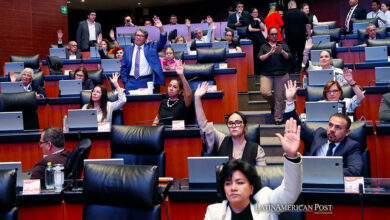While the Colombian government attacks mobility platforms with sanctions and blockades, the Salvadoran government seeks to legalize and strengthen it.

Photos: TW-petrogustavo, TW-PresidenciaSV
LatinAmerican Post | Sergio Alejandro Montealegre Ibarra
Escucha este artículo
Leer en español: Petro busca bloquear Uber y Bukele regularizarlo: contrastes en movilidad
In the last decade, digital mobility platforms have become a true revolution in the way people move around in big cities. Despite this, in Latin America they are still not exempt from controversy and setbacks. The governments of Colombia and El Salvador have opened a new chapter on the issue of the legality of mobile transport applications, each with a different approach. Let's see each one of them:
The Colombian Case: A Matter of Blockades and Sanctions
On January 30th, José Daniel López, executive director of Alianza In, a union that in Colombia brings together digital applications such as Uber, Beat, Cabify, Rappi and Domicilios.com, released a draft bill with which The Transportation Superintendency is planning to block mobility platforms, impose fines on citizens who use them, and immobilize cars used in this activity.
One of the sanctions provided for in the aforementioned draft is to order Internet providers and operators to disconnect, for up to thirty (30) days, the means of electronic commerce and technological platforms for which it is possible to establish the illegality of the service they provide, to which a fine of more than 20 million pesos (500 UVT) would be added.
The draft also contemplates fines of up to more than 10 million pesos (250 UVT) for people who contract transportation services with these platforms and for the owners of commercial establishments that promote their use. In addition, it also considers the immobilization or retention, for up to 30 days, of the vehicles whose unauthorized use of passenger transport is verified.
Also read: Soccer World Cup or Miss Universe. This costs to organize a mega event
Once this draft was known, the reactions from the platform drivers did not wait: blockades and protests in different parts of Bogotá were the order of the day both last Monday and Tuesday. At the end of the day, these left several of them detained, a policeman injured after being hit by a vehicle driven by one of the app drivers, and the unfortunate scene of an agent using excessive force to get him out of the car.
The Salvadoran Case: Towards Regularization
In parallel, that same January 30, the Public Works, Transportation and Housing Commission of the Legislative Assembly of El Salvador met in order to explore proposals and initiatives that allow the development and success of a law that regulates digital transportation platforms. , a meeting to which One App was invited as a mobility platform.
During the meeting topics were explored such as the safety of users, the search for benefits for drivers, the provision of a quality service and how to provide this mode of transport with a legal framework that not only the endowment of rights, but also obligations to the Salvadoran State and population.
One App representatives would bring to discussion the importance of providing platform drivers with the guarantees that allow them to provide their service, the need to be able to validate the identification of users for safety reasons and the acquisition of an insurance policy as an operating condition for drivers. Added to this, they recalled that, when regularizing the platforms, it is essential to take into account that each of them has its own policies of operating costs, fares to passengers and charges to drivers for the use of the platforms.
Within the discussion, Deputy Saúl Mancía emphasized the need to regularize this mode of transport by being part of the process of modernization of collective and selective passenger transport. On the other hand, Deputy José Urbina highlighted the responsibility of both the State and the platforms to regulate transport from a legal framework, provide a higher quality service, take care of passengers and ensure that they reach their destinations without any problem.
A Matter of Contrasts
Given the perspectives assumed by both the Colombian and Salvadoran governments, it is worth asking: if both countries face, in principle, the same problem, why do they have such different ways of dealing with it?
Part of the key to finding this difference lies in the very draft of the project presented by the Colombian government. According to it, the technological platforms that offer transport services "can compromise the efficient provision of the public service […] and affect the sustainability of the public transport industry, threatening the continuity and regularity of the basic public transport service". This means that, for the Colombian government, mobility platforms represent a threat to public transport.
In contrast, the Salvadoran government sees regularization as an opportunity to improve its economy and employment situation. For example, the representatives of One App at the meeting of the Public Works Commission assured that the drivers support the regularization of the system, since they currently lack social benefits and security guarantees. For his part, Deputy José Urbina said that El Salvador is going through a moment of opportunity due to the increase in tourism, for which reason, he stated, "it would be good for tourists to find all the available mobility alternatives that the country can offer to get around”.
It seems that the Colombian government, headed by Gustavo Petro, is unaware that its measures would violate the principle of Internet neutrality, as José Daniel López points out, when he writes on his Twitter account that "in no serious democracy, governments can block Internet content, protected by the principle of net neutrality". In addition, would forget that digital platforms, as highlighted by Fedesarrollo in one of its 2021 studies, have created an important job alternative for more than 120,000 people who have little chance of finding a formal job, need a secondary source of income or more job flexibility. On the contrary, El Salvador seems to understand this issue better when, in the mouth of its deputy Saúl Mancía, it maintains that “the State loses when the sectors are not formal”.





